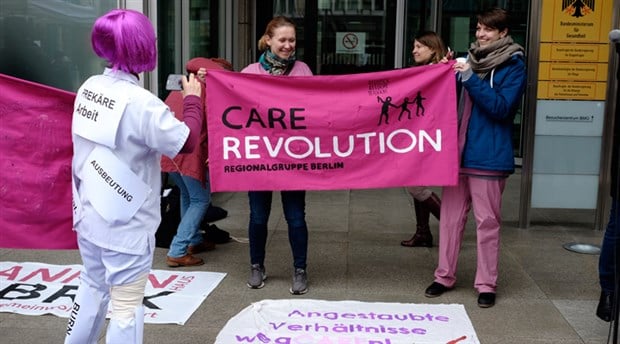The Protest of Women Healthcare Professionals in Berlin

Seçil Kalenderoğlu / Berlin
Today, Feminist slogans can be expected to fill the streets at various events and demonstrations in the German capital of Berlin. The first demonstration that will start in the morning has been organized by Feministischer Streik Berlin (Feminist Action Berlin), Kali Feminists, Berliner Bündnis für Mehr Personal im Krankenhaus (Berlin Alliance for More Hospital Staff) and Kritische Medizin Berlin (Critical Medical Professionals). The demonstration will take place in Robert Koch-Platz in front of Charité's headquarters which is the largest healthcare employer in Berlin, to draw attention to the working conditions of female nurses and healthcare workers.
According to a report from the Federal Employment Agency on the labor market situation in the care sector from 2019, 80 percent of the nursing staff in health care and 84 percent of the nursing staff in care for the elderly in Germany are women. In 2018, 94 percent of the pedagogical staff were women in the daycare centers, as can be seen in the report. The fact that these professions are poorly recognized by society and poorly paid is disguised by the narrative that the desire to take care of things and the feeling of doing something good are a sufficient replacement for adequate "wages". On this basis, the existing gender pay gap (wage difference between men and women) of 21 percent in Germany is justified. A petition is currently underway calling on the federal government to recognize unpaid, domestic "care work" as work.
We talked with the member of the organization group of the action, from Feministischer Streik Berlin and Kali Feminists Sophie Obinger. We discussed generally about the German Penal Code §218 and §219 which has not changed since the Nazi period and forbidding “to propose, declare and promote abortion” and precarious work conditions of women healthcare workers.
>> Firstly, I would like to ask you that who or what is the Feministischer Streik Berlin and Kali Feminists? How long have you been organizing demonstrations and what are the main motivations of coming together of this two groups?
Kali Feminists was founded in 2018 as a result of the strike by student workers in Berlin for a new collective wage agreement and was primarily concerned with the abolition of abortion paragraphs 218 and 219a of the German penal code. The group founded a campaign called "Strike away §218 and §219a" and highlighted the links of precarisation with patriarchal oppression.
After the successful women's strikes in Argentina, Poland and Spain, women who wanted to organize a feminist strike also came together in Berlin. We, as Kali Feminists, joined this organisation because we too think that the method of strike as a method of the working class is an effective tool to enforce our feminist demands. This means that since 2018 Kali has been an organic part of the women’s strike movement.
>> What are particularly important demands and concerns of Feministischer Streik Berlin and Kali Feminists?
A common demand is the abolition of the abortion paragraphs 218 and 219a of the penal code, which restrict the right of women and queers to physical self-determination in Germany. We also believe that issues of racism play a central role in the political organisation of women, so we support the demands of migrant women and queers, namely the abolition of all camps and an end to physical sexual violence against women refugees.
We are also fighting for an end to femicides: Every third day a woman is murdered by her current or ex-partner in Germany. In the case of structural violence against women, we see that the capitalist conditions of production are the material basis for this violence, and we therefore fight against it with all means.
>> On March 8, you are planning an action in front of Charité, one of the largest university hospitals in Berlin. Could you please explain why you chose this location?
With 15,000 employees, the Charité is the largest hospital in Europe and also has many outsourced subsidiaries. Since the 8th of March falls on a Sunday this year, we have chosen a location where work is also done on weekends including Sundays. Especially in the hospital, many women work as nurses under precarious employment conditions, and we want to draw attention to this together with the Berlin Alliance for More Hospital Staff and the Critical Medical Professionals.
We chose this location because we are in solidarity with the strike of the employees of Charité Facility Management (CFM), which has 3000 employees and therefore is the largest outsourced subsidiary company of the Charité. With the action, we want to fight against wage dumping and wage flight which is initiated by the Berlin Senate.
>> What are your expectations from 8 of March and how would you like to call people for the action, to join with you?
We are expecting several hundred people to join our action at Robert-Koch-Platz this 8th of March and invite everyone to fight with us against precarisation and gender oppression. We also invite men who are in solidarity with us, because we think that feminist concerns are ultimately also in the interest of working men.



